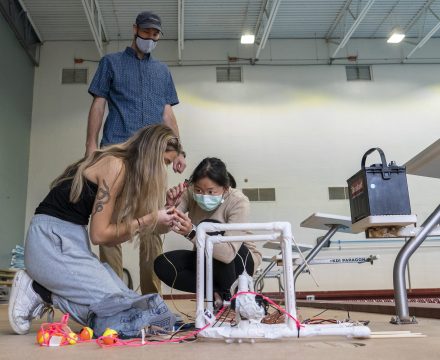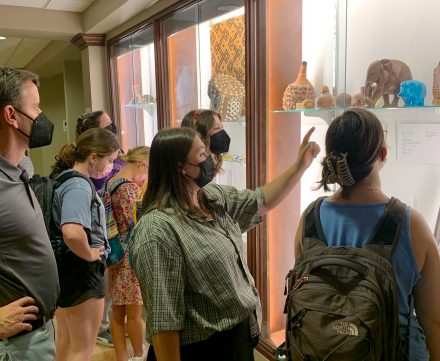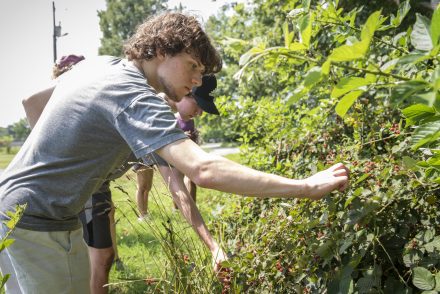Programs in Engineering Design, Food Studies, Islamic Studies, Museum Studies & Public History and Sustainable Enterprises in the Elon College, the College of Arts & Sciences welcome students across majors and disciplines.
Spanning food, culture, politics, design and sustainability, a series of new minors available to students this fall will build skills and encourage thinking across disciplines.
The five minors — Engineering Design, Food Studies, Islamic Studies, Museum Studies and Public History and Sustainable Enterprises — allow undergraduates to hone skills related to their majors or career goals and expand knowledge around emerging and timely issues. They are housed in or involve partnerships with faculty in Elon College, the College of Arts and Sciences.
Engineering Design

The Engineering Design Minor is aimed at students from any major who want to learn and apply foundational engineering skills within their own disciplines. Students will gain math, computing and engineering fundamentals for problem-solving in nontechnical fields. The program includes a capstone experience through the EGR 2210 Engineering Design for Service course, which applies engineering skills to solving a real-world problem in the community.
The minor is intended to bridge the arts and sciences, business, communication and education and be accessible to all Elon students, said Assistant Professor of Engineering Rich Blackmon, the minor’s coordinator.
Students who complete the program will be able to produce solutions that meet specified needs with consideration for public health, safety and welfare as well as global, cultural, social, environmental and economic factors. They will also have experience communicating and working effectively with a range of partners while solving problems.
Food Studies

What do we eat and how much? Where does it come from? How and why is food a vital aspect of culture?
The Food Studies Minor offers students a unique opportunity to study and synthesize concepts around food from multiple perspectives — the arts and humanities, social sciences, natural sciences, education, communications and business — in an integrated course of study.
The minor includes courses in nutrition, food and its components; sustainable food systems and production; and food, culture and representation. This interdisciplinary framework will lead to understanding and deep analysis of issues around food production, distribution and consumption.
“The Food Studies Minor is innovative and draws from multiple disciplines to provide the breadth and depth of knowledge and understanding food-related issues. This minor will expand students’ skill sets, provide opportunities for students to work in food-related fields, and contribute to much needed change in food systems,” said Associate Professor of Exercise Science Svetlana Nepocatych, the minor’s coordinator.
Islamic Studies
The Islamic Studies Minor promotes the study of Islam from contemporary, historical and global perspectives, encouraging examination of the complexity of Muslim identities. Encompassing religious studies, history, political science, comparative literature, communications — and embracing approaches from racial and ethnic studies, gender studies and post-colonial studies — students will gain understanding of the many ways Muslims have influenced the world.
“The Islamic Studies Minor is an excellent complement to absolutely any major and will provide intercultural competency necessary to succeed in any career,” said Associate Professor of Religious Studies Ariela Marcus-Sells, the minor’s coordinator. “In our initial survey, students majoring in fields as diverse as communications, biology, political science, theater and religious studies and more expressed interest in the program. This program supports Elon’s mission of producing global citizens by engaging the study of Islam as a truly global religious tradition and including courses in many different departments and programs.”
Museum Studies and Public History

The Museum Studies and Public History Minor fosters knowledge and experience in how the public encounters narratives about the past and present through exhibits, art, media, memorials and sites. Students will analyze issues related to preservation, collection, display, ethics and communication in preparation for careers related to museum and public history work. A capstone experience includes an internship or significant project in the student’s area of interest.
“We want students to come away with an understanding of how museums have worked and can work as repositories of culture,” said Associate Professor of Art History Evan Gatti, the program’s coordinator. “They are places where values are proclaimed and memories are preserved in all the ways that are positive and all the ways that are problematic. Students will leave our program thinking critically about the decisions being made and values presented in the ways museums and public sites are created, curated and presented, and with connections and experiences with community partners.”
Sustainable Enterprises

Sustainable enterprises are for-profit and non-profit organizations attending to the needs of the present and future generations with products, services and activities that protect and preserve environmental integrity while achieving financial performance.
The Sustainable Enterprises Minor will build leadership in ethical, economic, political and environmental dimensions of sustainability in the context of destabilizing environmental systems and climate change. Students who complete the minor will have an environmental science and business foundation to understand and address the conflicting issues that often arise at the intersection of business and the environment.
“A key objective in the Boldly Elon strategic plan is to help our students build a sustainable future. And for good reason! The need for such leadership is more and more evident,” said Assistant Professor of Management Scott Hayward. “Currently, we see across industries an increased focus on corporate sustainability. Companies are building departments and creating executive positions to make, measure, and attain green commitments.
“Fortunately, we have relevant expertise across the University. This minor is a joint initiative between the College of Arts and Sciences and the Love School of Business to connect this expertise. The ultimate goal is to bring CAS and LSB students together to share ideas and create solutions that get us closer to that more sustainable future.”



